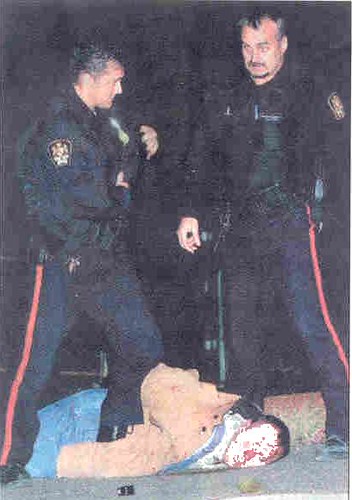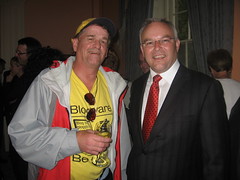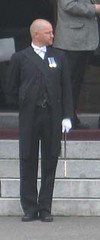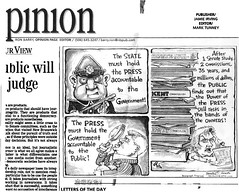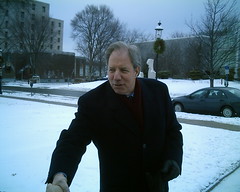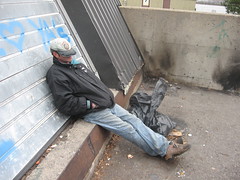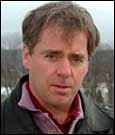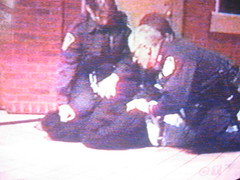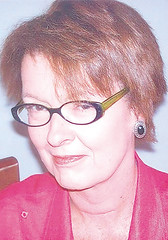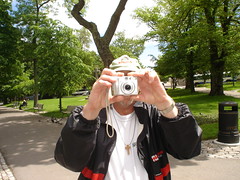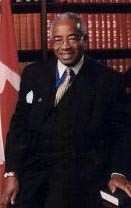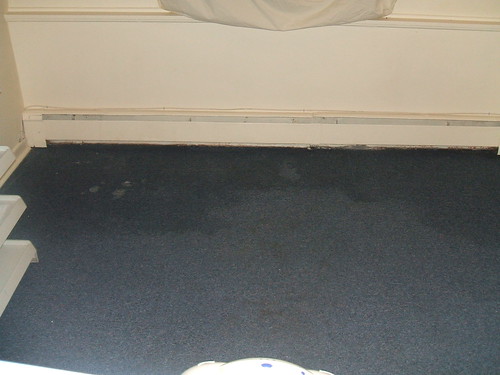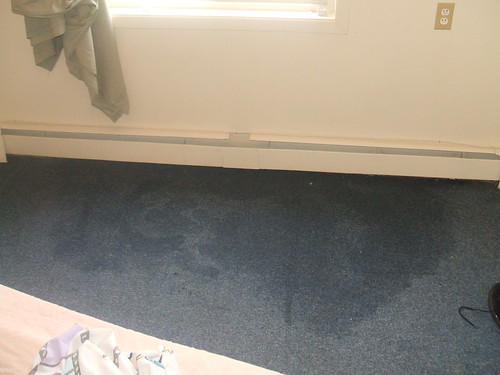SAINT JOHN - Politicians and journalists are a lot alike and in some ways that is not a good thing, says Jane Purves, the Irving chair in journalism at St. Thomas University in Fredericton.
Politicians and reporters are typically good generalists, can grasp issues quickly and like working under pressure. And most, at least when they start out, are doing what they do for the right reasons, said Purves, a former newspaper editor and Nova Scotia cabinet minister.
They also share a "huge amount of power" and their relationship is "essential to a functioning democracy."
But there's something else they share and "it appears to be getting worse in many cases," said Purves, who will speak about politicians and journalists when she delivers a public lecture in Saint John tonight.
"In general, both of them are drifting into this too many photo ops and stories trying to be entertaining instead of worthy. News is becoming entertainment and politicians are stuck on the same key messages."
Purves believes the media is trying to capture the attention of increasingly disinterested readers/viewers who would rather surf the Internet or watch cable TV than pick up a newspaper or tune into the evening news.
Politicians, meanwhile, are trying to please a growing number of apathetic voters who don't bother casting ballots because they don't see any real choices.
She doubts either politicians or reporters will prove successful if they continue down the same path.
"I don't think anyone has shown trying to put fluffy stories on page one improves circulation," Purves said.
And ultimately, she contends it's what led to the political demise of former prime minister Paul Martin. "He appeared to change his tune every time someone asked him something . . . and everything was a priority.
"People didn't know where he stood."
Purves thinks news organizations and politicians have to be "as authentic as possible rather than try to change what they are to gain attention."
How to do that isn't as simple though. "If I had the answers, someone would have hired me for 40 zillion dollars," she laughed.
She suggests getting back to basics - being true to one's self and doing the job.
Purves began her post at St. Thomas in September. She spent 25 years in the newspaper business. She was managing editor of the Chronicle Herald and editor of the Halifax Daily News. She served in the cabinet of former Nova Scotia premier John Hamm, holding the portfolios of Education, Health and minister responsible for the Status of Women.
She said she is honoured to be named to her new post at the Irving chair in journalism at St. Thomas University.
And while she admits she didn't know much about the job before taking over the reins in September, she thinks it's a good idea. "It allows somebody new to come in every year and share their experience and insights - if they have any."
The best advice this self-described "at bottom, serious journalist" has to offer students includes: stay as curious at possible, try not to prejudge anyone, and show elected officials some respect "until you have reason to know it's not deserved."
The Irving chair in Journalism, a $1-million endowment by the Irving family, brings a distinguished journalist to St. Thomas University each year to teach, conduct workshops and deliver a lecture series.
The title of Purves' free public lecture in Saint John tonight is "Through the Looking Glass: How Journalism and Politics Are the Same and How They Aren't." Her lecture will be held at the New Brunswick Museum's Mary Oland Theatre at Market Square at 7 p.m. The lecture will be repeated in Moncton on Nov. 16.
Jane Purves spent 25 years in the newspaper business, working as both a reporter and managing editor.
But she's also been on the other side of the news, serving as a cabinet minister for former Nova Scotia premier John Hamm, being challenged on controversial decisions, such as closing a French immersion school, and having her past intravenous drug use exposed.
Then, after being defeated, she went back to journalism at another competing daily newspaper - ironically, as the boss of the reporter who wrote about her struggle with drug addiction during her teens and 20s, having a criminal record for possession of marijuana, losing custody of her only son for several years, and contracting Hepatitis C.
Purves brings this unique perspective to her new position as the Irving chair in journalism at St. Thomas University.
"It was an interesting crossover experience , . . I don't know about unique," she said, preferring to describe her incredible journey as "complex."
Still, she's honoured by her new post, she said.
And while she admits she didn't know much about the job before taking over the reins in September, she thinks it's a good idea. "It allows somebody new to come in every year and share their experience and insights - if they have any."
The best advice this self-described "at bottom, serious journalist" has to offer students includes: stay as curious at possible, try not to prejudge anyone, and show elected officials some respect "until you have reason to know it's not deserved."
The Irving chair in Journalism, a $1-million endowment by the Irving family, brings a distinguished journalist to St. Thomas University each year to teach, conduct workshops and deliver a lecture series.
Tonight Purves will speak in Saint John. The topic of the free public lecture is "Through the Looking Glass: How Journalism and Politics Are the Same and How They Aren't."
Again, Purves, 57, will draw on her personal experiences as managing editor of the Chronicle Herald, editor of the Halifax Daily News, minister of Education, minister of Health, minister Responsible for the Status of Women and being behind the scenes as chief of staff.
A cabinet minister trying to decipher their portfolio isn't very different from a reporter trying to figure out a subject they've never covered before, she explained.
Politicians and journalists are a lot alike and in some ways that is not a good thing, says Jane Purves, the Irving chair in journalism at St. Thomas University in Fredericton.
Politicians and reporters are typically good generalists, can grasp issues quickly and like working under pressure. And most, at least when they start out, are doing what they do for the right reasons, said Purves, a former newspaper editor and Nova Scotia cabinet minister.
They also share a "huge amount of power" and their relationship is "essential to a functioning democracy."
But there's something else they share and "it appears to be getting worse in many cases," said Purves, whose topic will be politicians and journalists when she delivers a public lecture in Saint John tonight.
"In general, both of them are drifting into this too many photo ops and stories trying to be entertaining instead of worthy. News is becoming entertainment and politicians are stuck on the same key messages."
Purves believes the media are trying to capture the attention of increasingly disinterested readers/viewers who would rather surf the Internet or watch cable TV than pick up a newspaper or tune into the evening news.
Politicians, meanwhile, are trying to please a growing number of apathetic voters who don't bother casting ballots because they don't see any real choices.
She doubts either politicians or reporters will prove successful if they continue down the same path.
"I don't think anyone has shown trying to put fluffy stories on page one improves circulation," Purves said.
And ultimately, she contends it's what led to the political demise of former prime minister Paul Martin. "He appeared to change his tune every time someone asked him something . . . and everything was a priority.
"People didn't know where he stood."
Purves thinks news organizations and politicians have to be "as authentic as possible rather than try to change what they are to gain attention."
How to do that isn't as simple though. "If I had the answers, someone would have hired me for 40 zillion dollars," she laughed.
She suggests getting back to basics - being true to one's self and doing the job.
Purves began her post at St. Thomas in September. She spent 25 years in the newspaper business. She was managing editor of the Chronicle Herald and editor of the Halifax Daily News. She served in the cabinet of former Nova Scotia premier John Hamm, holding the portfolios of Education, Health and minister responsible for the Status of Women.
She said she is honoured to be named to her new post at the Irving chair in journalism at St. Thomas University.
And while she admits she didn't know much about the job before taking over the reins in September, she thinks it's a good idea. "It allows somebody new to come in every year and share their experience and insights - if they have any."
The best advice this self-described "at bottom, serious journalist" has to offer students includes: stay as curious at possible, try not to prejudge anyone, and show elected officials some respect "until you have reason to know it's not deserved."
The Irving chair in Journalism, a $1-million endowment by the Irving family, brings a distinguished journalist to St. Thomas University each year to teach, conduct workshops and deliver a lecture series.
The title of Purves' free public lecture in Saint John tonight is "Through the Looking Glass: How Journalism and Politics Are the Same and How They Aren't."
Purves' lecture will be held at the New Brunswick Museum's Mary Oland Theatre at Market Square at 7 p.m. The lecture will be repeated in Moncton on Nov. 16.
It's how Purves conducts herself and it seems to work.
When questioned in 1999 by reporter David Rodenhiser of the Daily News about her past, she answered openly and honestly.
She shared how she experimented with so-called soft drugs in her teens, then got hooked on hard drugs. And she talked about how, with professional help and the support of her family, she got clean.
"I made up my mind and I just stopped," she said, joking that she never went to Narcotics Anonymous; she simply channeled the "disorder" into something productive, being a self-professed work-a-holic.
To this day, Purves is not convinced her addiction was terribly relevant, given that she had a 20-plus year career under her belt between kicking drugs and becoming a politician. But she doesn't feel she was treated unfairly.
Had the tables been turned and she was the reporter, she would have asked the same questions, she said.
And she actually respected Rodenhiser for having the "guts" to come out and ask the questions she knew others were talking about.
So on her first day as editor at the Daily News, when he asked her if he still had a job, she laughed.
Most people treated her better after her story broke, said Purves. She received letters of support from across North America.
"I think almost every family has something like that - an aunt or uncle or father or mother or child who did something wrong. They have things they've kept secret all their life because they thought people would reject them because of it," she said.
"But just because you have some screw up in your past doesn't mean you're unfit for public life or some kind of leadership role. It might make you more fit because you have more empathy for people."
Purves' direct approach has also helped repair her relationship with her son, who turns 37 next month. In fact, it was his idea for Purves to move in nextdoor to him and his wife in Halifax, enabling her to see her two granddaughters, aged three and four months, every day.
"Things are great."
As for the Hepatitis C, Purves remains symptom-free of the liver disease and tries not to dwell on it. "It's a weird kind of death sentence," she said. "It brings you closer to your mortality...It makes you a bit more humble.
"But we all are going to die."
Purves isn't sure what she'll do when her new position wraps up at the end of November. She just plans to keep the door open to "whatever might come along."
And if nothing comes along right away, she'll have time to watch cartoons with her granddaughters, read, and garden.
Retirement is "always an option.
"But I'll keep working at something - that's for sure."
